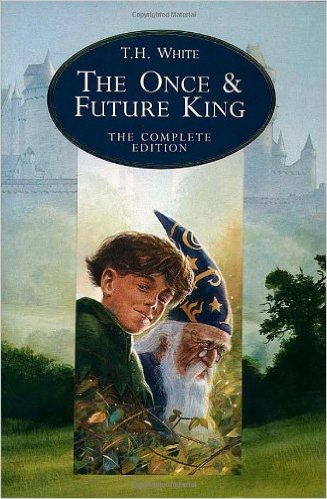The literary realm is often transformed through the esoteric lens of Arthurian legends, and T.H. White’s magnum opus, The Once and Future King, stands as a paragon of this evolution. This book weaves a tapestry rich in themes of power, betrayal, loyalty, and the ceaseless pursuit of justice, inviting readers to explore the implications of leadership through a fresh perspective. The profound journey of King Arthur from naive youth to an embattled ruler encapsulates a myriad of moral quandaries that resonate with our contemporary ethos.
To encapsulate the essence of the narrative, it is vital to delve into White’s intricate portrayal of character development. Arthur, known affectionately as Wart during his formative years, embarks on a whimsical yet poignant journey of self-discovery. The innocent inquiries of childhood serve as the foundation for his development. White’s storytelling tantalizingly juxtaposes the innocence of Wart with the heavy burdens of kingship he is destined to shoulder. This duality is not merely a narrative choice; it intricately mirrors our own struggles with identity and responsibility.
The opening segments of the novel provide a robust exploration of the formative influences that shape Wart. Under the tutelage of Merlin, the wise yet eccentric wizard, the young boy is educated in ways that transcend conventional learning. Through transformative metamorphoses into various animals, Wart experiences life from different perspectives. This mechanism serves as a poignant literary device, compelling readers to engage in a profound contemplation of empathy and the broader implications of understanding one another. As Wart becomes a fish, a bird, and a badger, the text provokes a tantalizing inquiry: What are the implications of experiencing life outside of human limitations?
Intriguingly, the novel’s tonal shifts encapsulate the momentous transitions from whimsical adventure to the stark realities of adulthood. White ardently advocates for the intrinsic potency of idealism through characters such as Lancelot and Guinevere. Their tumultuous relationship, steeped in desire and conflict, highlights the fragility of human connection amidst the weighty expectations of destiny. The betrayal and love displayed in their interactions serve as a harbinger of the broader conflicts that plague Arthur’s kingdom, drawing attention to the consequential nature of personal choices.
Moreover, the thematic elements of honor and chivalry are meticulously examined through the Knights of the Round Table. The camaraderie shared amongst these formidable warriors is a model of noble ideals; yet, White expertly dissects this veneer by revealing underlying tensions. As loyalties are tested and betrayals emerge, readers are unfurled into a realm where honor becomes as susceptible to corruption as it is to heroism. The Once and Future King prompts a reevaluation of the simplistic dichotomy of good versus evil, a notion that continuously evolves within the narrative.
White’s prose is marked by a lyrical quality that oscillates between stark realism and rich fantasy, inviting readers not just to observe but to immerse themselves within the text. Each page is imbued with vivid imagery that captures the imagination—cloudy skies that foretell battles, tranquil lakes that serve as refuges for reflection. Such picturesque descriptions are not simply for aesthetic pleasure but enhance the narrative depth, allowing readers to grapple with the broader philosophical questions posed by White.
What further distinguishes White’s work is his ability to bridge the chasm between past and present, employing Arthurian legend as a vehicle for contemporary quandaries. In navigating issues of governance, justice, and societal roles, the book resonates with modern readers who remain entrenched in a world rife with power struggles. The allegorical interpretations of kingship bespeak an eternal truth: that leadership requires not just strength but a profound moral compass, an insight that remains applicable regardless of the breaches of time.
As Arthur endeavors to unify his realm, he confronts the disillusionment often associated with noble aspirations. The idealistic vision of Camelot stands in stark contrast to the ensuing chaos, a poignant reminder that utopian dreams are frequently impeded by the grave complexity of human nature. Here, White challenges us to reflect on our own societal constructs—what does it mean to strive for a just world? Is it an attainable goal or a mere mirage?
Throughout his journey, Arthur emerges as a quintessential tragic hero, ultimately grappling with the repercussions of his decisions. The poignant climax, steeped in loss and introspection, invites a cathartic resonance that lingers long after the final pages are turned. In this way, White not only crafts a riveting tale of adventure but an intricate meditation on the philosophy of governance and the quintessential human experience.
The impact of The Once and Future King extends beyond the boundaries of its narrative. It cultivates an inquisitive mind, prompting readers to challenge their perceptions of history and its relevance in contemporary discourse. White’s exploration of such timeless themes encourages a shift in perspective, awakening an acute awareness of the complexities inherent in our collective experience.
In conclusion, T.H. White’s The Once and Future King is more than a mere retelling of Arthurian legend. It is a cerebral exploration of what it means to lead, to love, and to lose. This book offers us an invitation to probe deeper into the intricacies of our own moral landscapes while piquing the curiosity for what may lie ahead. As we traverse the pages of this exquisite saga, we are reminded of the intricate threads that bind our stories to that of Arthur and his legendary court, beckoning us to ponder: what will be the legacy of our actions in the tapestry of time?
